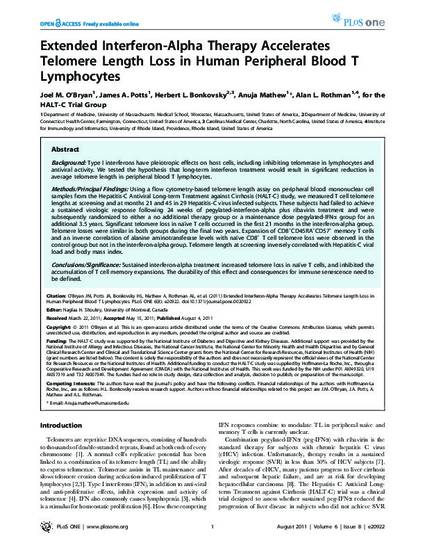
BACKGROUND: Type I interferons have pleiotropic effects on host cells, including inhibiting telomerase in lymphocytes and antiviral activity. We tested the hypothesis that long-term interferon treatment would result in significant reduction in average telomere length in peripheral blood T lymphocytes.
METHODS/PRINCIPAL FINDINGS: Using a flow cytometry-based telomere length assay on peripheral blood mononuclear cell samples from the Hepatitis-C Antiviral Long-term Treatment against Cirrhosis (HALT-C) study, we measured T cell telomere lengths at screening and at months 21 and 45 in 29 Hepatitis-C virus infected subjects. These subjects had failed to achieve a sustained virologic response following 24 weeks of pegylated-interferon-alpha plus ribavirin treatment and were subsequently randomized to either a no additional therapy group or a maintenance dose pegylated-IFNalpha group for an additional 3.5 years. Significant telomere loss in naive T cells occurred in the first 21 months in the interferon-alpha group. Telomere losses were similar in both groups during the final two years. Expansion of CD8(+)CD45RA(+)CD57(+) memory T cells and an inverse correlation of alanine aminotransferase levels with naive CD8(+) T cell telomere loss were observed in the control group but not in the interferon-alpha group. Telomere length at screening inversely correlated with Hepatitis-C viral load and body mass index.
CONCLUSIONS/SIGNIFICANCE: Sustained interferon-alpha treatment increased telomere loss in naive T cells, and inhibited the accumulation of T cell memory expansions. The durability of this effect and consequences for immune senescence need to be defined.
- Telomere length,
- T cells,
- Cytotoxic T cells,
- Memory T cells,
- Interferons,
- Telomeres,
- Body mass index,
- Hepatitis C virus
PLoS One. 2011;6(8):e20922. Epub 2011 Aug 4. Link to article on publisher's site
Available at: http://works.bepress.com/alan_rothman/12/